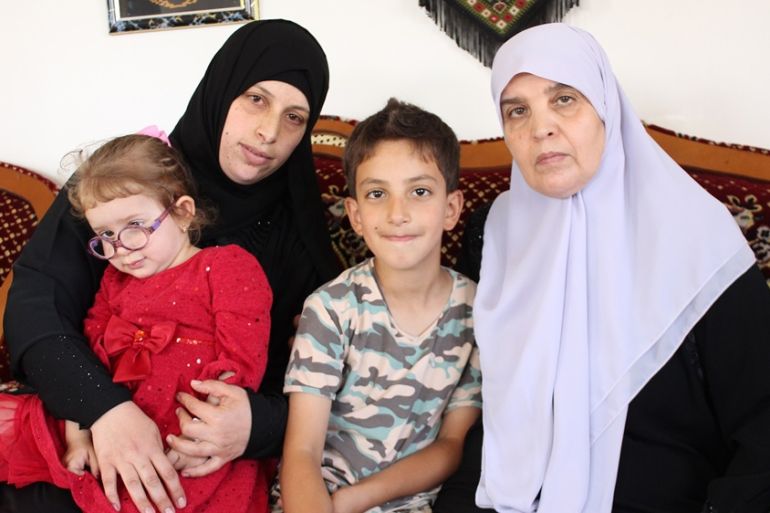Family of man killed by Israeli army feels ‘powerless’
Iyad Hamed, a 38-year-old Palestinian with a cognitive impairment, was shot dead in Silwad last month.

Silwad, occupied West Bank – On a recent afternoon, three generations of the Hamed family gathered in the living room of their family home in the occupied West Bank town of Silwad.
Reunited amid grim circumstances, the family was mourning the death of Iyad Hamed, 38, who was shot and killed by Israeli soldiers on the outskirts of town late last month.
Keep reading
list of 4 itemsPalestinian Prisoner’s Day: How many are still in Israeli detention?
‘Mama we’re dying’: Only able to hear her kids in Gaza in their final days
Europe pledges to boost aid to Sudan on unwelcome war anniversary
Brothers, parents and cousins came and went, as Iyad’s two young children clambered over the sofas. Iyad, who had a cognitive impairment, was shy, quiet and enjoyed walking by himself or spending time with his wife and children, his family said.
“He was a simple guy and led a simple life. His mind operates differently from our minds; he was just very simple,” Iyad’s brother, Yahya, told Al Jazeera.
READ MORE: Report slams Israel’s military law enforcement system
Iyad had worked in the building industry for two decades, initially with his father Zakaria. They often worked in the Palestinian towns and villages of the central occupied West Bank. In the week before his death, Iyad had been working for a contractor in the village of Mazraa, just north of Silwad.
“We were very close. We spent a lot of time together. I took him to work with me in construction in 1990 and we continued until I left for the United States. He was reliable and loyal. He was always the one we could turn to,” Zakaria told Al Jazeera, holding back tears.
Iyad’s parents, along with five of his brothers, have all moved to the US within the past decade, and Iyad was also hoping to relocate there. Yahya, who lives in Ohio, visited his brother earlier this summer for a vacation.
“We talk a lot on the phone; we are a close family,” he said. “Iyad likes to get dressed, and dress nice, so when I came from the States, I brought him some new shoes.”
![Zakaria, Iyad's son, and Layan, his daughter, sit with their aunt outside the family home, underneath posters remembering Iyad [Nigel Wilson/Al Jazeera]](/wp-content/uploads/2016/09/4970d9c8cb1f43848742342f36b39c18_18.jpeg)
The morning of Friday, August 26, started typically for the Hamed family.
“It was a completely normal day; nothing strange or different happened that morning. We had breakfast together with the family,” Nirmeen Hamed, Iyad’s wife, told Al Jazeera.
After breakfast, Iyad left his home and picked up treats for his wife and two young children from the local grocery store. After returning home to deliver the snacks – crisps and chocolates for eight-year-old Zakaria and two-year-old Layan – he told Nirmeen that he did not want to be late to the mosque, and he promptly left the house.
Within an hour, the town was awash with rumours that there had been an incident close to the Israeli army watchtower on the road to Yabrud, a neighbouring town. Iyad had been shot dead.
Iyad’s family believes that he was walking to the mosque in Yabrud when he encountered soldiers, panicked and began to run. Residents at a nearby home said they heard shots, followed by Hebrew shouting, followed by more shots. A spokesperson for the Israeli army told Al Jazeera that the circumstances of the shooting were being investigated.
His kids are now orphans. His wife is now a widow. They burned my heart.
Abdel Hamid Yousef, who regularly drives a sewage tanker on the route from Yabrud to Silwad, was passing by at the time. He told Al Jazeera that he saw Iyad, whom he knows personally, looking confused and frightened, and that he was unarmed.
“He was near the watchtower. He looked very confused, like he didn’t know where to go. He was panicking and disoriented. He got to the fence and then turned back and ran towards the main road back to Silwad,” Yousef said. “That’s when I heard the shots.”
Yousef said he heard two shots, followed by a pause, and then a few more shots.
“I was around 10 metres away from Iyad when he was shot in the back and fell. I kept driving, until I reached the nearest shop, where the shopkeeper called the ambulance – but it was out of town at the time.”
OPINION: How impunity defines Israel and victimises Palestinians
An Israeli ambulance ultimately arrived, but it is unclear whether Iyad had already died by that point. Within hours, his body was returned to the Hamed family, and a funeral took place the same day.

“We really hope that justice will be done. We want those who did this to be put on trial and go to prison. The choice they made, to shoot him, is not right. They could have apprehended him,” said Iyad’s mother, Shukria. “His kids are now orphans. His wife is now a widow. They burned my heart.”
An investigation into the incident has been ordered, with the soldier who shot Iyad called for questioning by the military police on suspicion of causing death through negligence, but no charges have been laid.
The family remains sceptical that charges will ever be brought, noting that the military investigation system rarely punishes soldiers who kill Palestinians. In May 2016, the leading Israeli human rights group BTselem announced that it would stop referring cases to the military law enforcement system, which it described as a “whitewash mechanism”, with only a small fraction of cases leading to charges.
“When [Israeli army] soldiers shoot people like that, there are no consequences, so it’s going to keep happening,” Yahya said. “It’s just sad; we are powerless. There’s nothing we can do.”